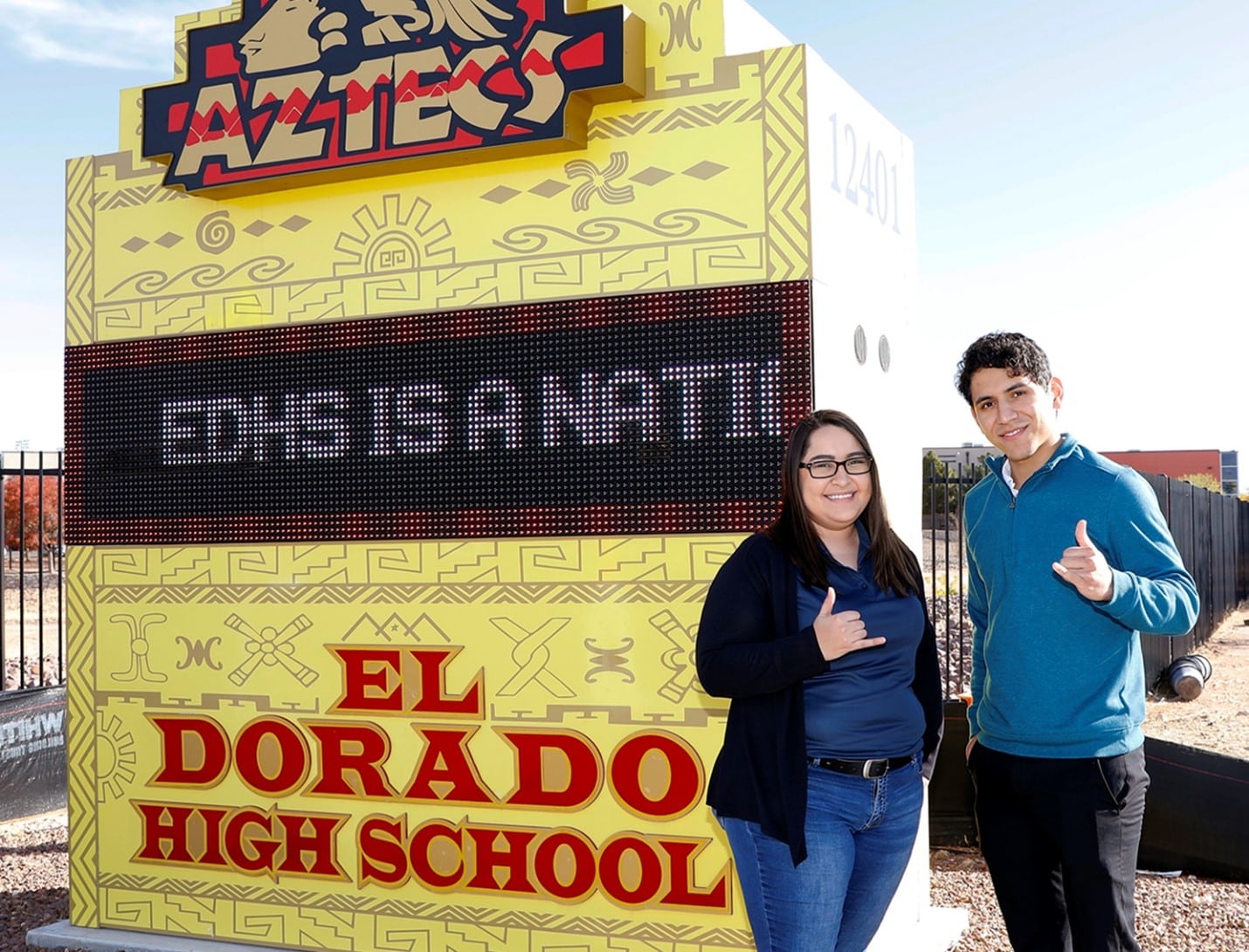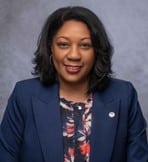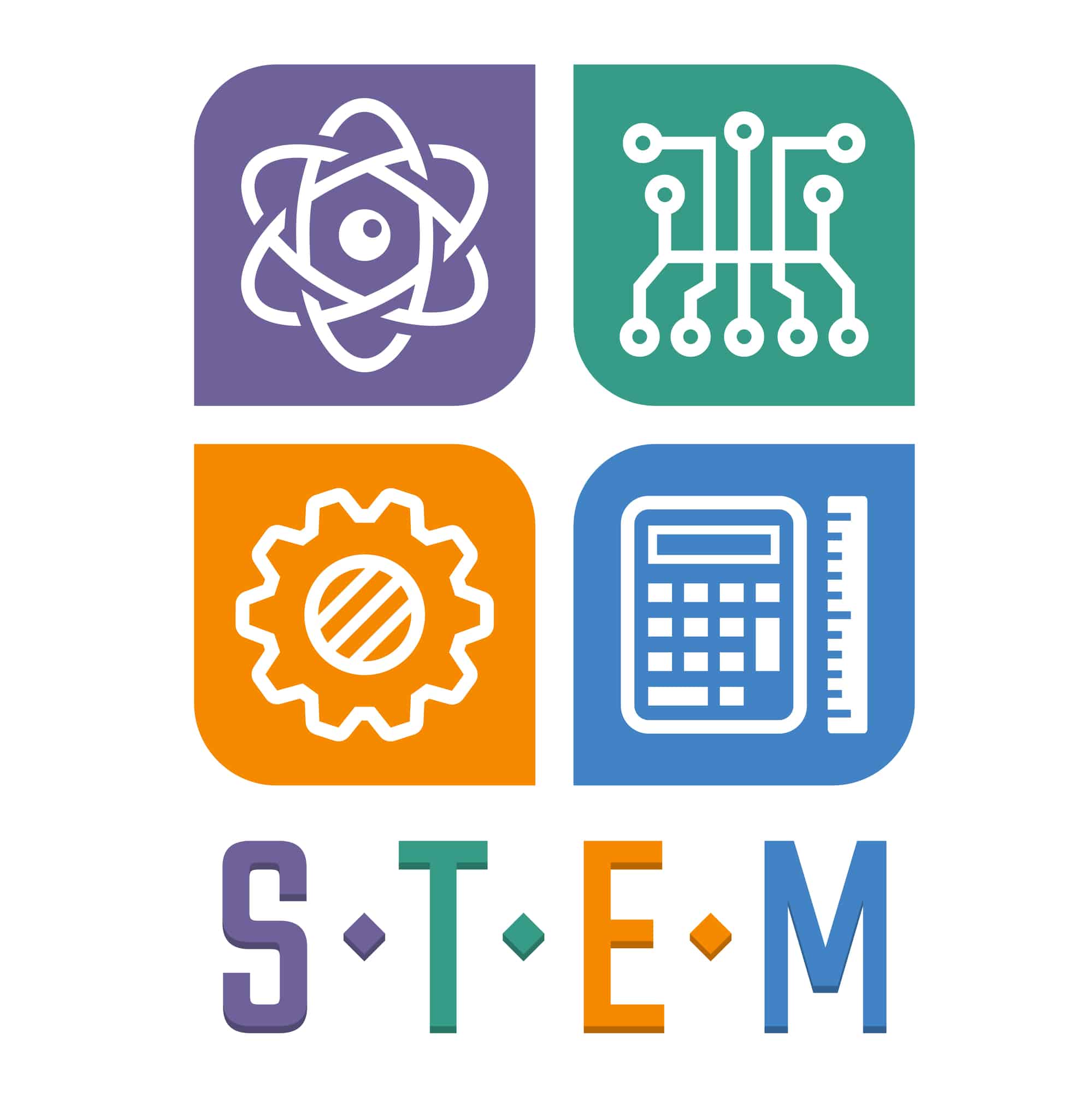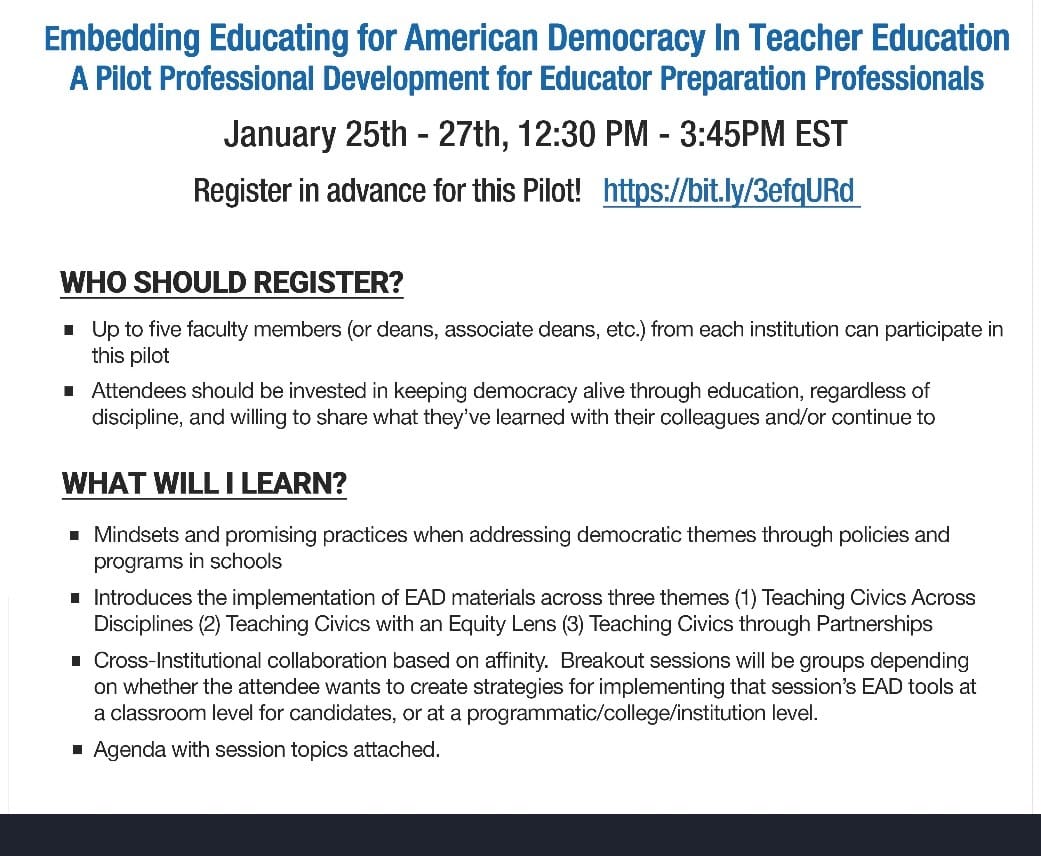18 Mar2022
By Muhammad Kara and Zach Curtis
 AACTE has partnered with graduate students from the George Washington University and the Learning Policy Institute to distribute a survey intended for current candidates for teacher licensure. Specifically, they are seeking candidates of programs that have a teacher residency, student teaching, or Grow Your Own component. Candidates of diverse racial and socioeconomic backgrounds, as well as candidates for special education bilingual education, are highly encouraged to participate. This survey will aid research on the ways in which AmeriCorps grants could be utilized to deploy highly prepared teachers to high-need schools.
AACTE has partnered with graduate students from the George Washington University and the Learning Policy Institute to distribute a survey intended for current candidates for teacher licensure. Specifically, they are seeking candidates of programs that have a teacher residency, student teaching, or Grow Your Own component. Candidates of diverse racial and socioeconomic backgrounds, as well as candidates for special education bilingual education, are highly encouraged to participate. This survey will aid research on the ways in which AmeriCorps grants could be utilized to deploy highly prepared teachers to high-need schools.
15 Mar2022
By Amanda Wilkerson and Shalander Samuels
Diversifying the professoriate pipeline is fraught with both opportunities and challenges. On the one hand, while higher education continues to attract a diverse student body, fewer than 6% of professors teaching inside postsecondary institutions are minoritized. Nonetheless, organizations such as the American Association of Colleges for Teacher Education (AACTE) have made a nearly three-decade commitment to reversing the aforementioned through its programming work of mentoring doctoral students, in particular, and future educators of color in general, to take on instructional and research roles within the field and the academy. As early-career professors within college level education programs, we are both good examples of the strong influence mentorship have on diversifying the education pipeline. Furthermore, we believe that the Holmes Scholar program is a case study for investigating the potential of mentoring as a beautiful instrument for reimagining how minoritized scholars can advance in the academy. As a result, ground-breaking work was publicly disseminated to share how students transition into scholars, which was aided by both formal and informal mentorship initiatives.
15 Mar2022
By Elizabeth S. Brown and David Fuentes
In this blog post, members of the Educating for American Democracy (EAD) pilot program outline how EAD can best work with educator preparation programs to address threats to schools’ ability to prepare civically engaged students, the topic of discussion at their 2022 Annual Meeting Learning Lab session.
In 2021, AACTE released a report, Revolutionizing Education for All Learners, that detailed its strategic plan for following the COVID-19 pandemic with a revolution in education intended to address long-standing and newly discovered educational inequities (AACTE, 2021). Among its strategic planning outcomes was a dedication and commitment to have democratic principles guide the education revolution, stating “democratic principles must guide what we revolutionize toward” (p.8). Democratic principles, coupled with inclusive pedagogies, specifically inquiry, encompass great potential in addressing stagnant educational gaps. AACTE’s recommitment to democratize teacher education pedagogy and principles culminated in a Pilot program, Educating for American Democracy, in which both authors were participants. Struck by the possibilities of enhanced democratic principles guiding teacher preparation and teaching and learning in K-12 schools, the authors share about the pilot experience. The authors also offer their view on the shift’s constraints and possibilities to enhance educator preparation and ultimately to address longstanding questions about equity and school outcomes in American public schools (Fuentes, 2022).
15 Mar2022
By Nicole Dunn

You may have heard the term “intersectionality” a lot lately, a term coined by Kimberlee Crenshaw in 1989 to describe how systems of oppression overlap to create distinct experiences for people with multiple identity categories. Those familiar with Crenshaw’s work know that the term was once used academically purely to shape legal conversations about racial and social injustice in systems, most notably policing. Now, “intersectionality” is part of the national lexicon, being used in the forefront of the country’s debates around racial and social injustice in the last few years; however, that should not dissuade educators from looking at their work through this lens.
For educators, intersectionality is used to frame the experiences of historical and current figures who have multiple identities when they teach. For example, during Women’s History Month, it’s important for educators to consider how the experiences of women of color, queer and trans women, women with disabilities, women with different body types, and multi-lingual women differ, and then represent them as such in their curriculum. Educators can build this intersectional teaching muscle by having conversations about their diverse experiences with one another and, as teachers, share research and resources that elevate the truth of women with intersectional identities in our schools. This is why, on International Women’s Day, we asked several of our members and staff to answer the question:
Why is integrating women’s history through an intersectional lens important to you and your work in education?
15 Mar2022
By Daniel Perez
This article originally appeared on the UTEP website.

Photo: Laura Trejo / UTEP Marketing and Communications
Ten graduate students in The University of Texas at El Paso’s teacher preparation program earned $10,000 scholarships to help finance their education and teacher certification, thanks to a $108,000 grant from the Charles Butt Foundation.
UTEP nominated students for the Charles Butt Scholarship for Aspiring Teachers who were accepted into the accelerated M.A. in Education with teacher certification program, which includes a year-long residency in partnership with El Paso County school districts. Those nominees went through two rigorous application processes — one at UTEP and the other through the Charles Butt Foundation (CBF), formerly the Raise Your Hand Texas Education Foundation.
Erika Mein, Ph.D., associate dean for undergraduate studies and educator preparation in the College of Education, is a principal investigator of CBF’s Raising Texas Teachers partner program at UTEP. She said she was elated that the CBF selected 10 UTEP students to be part of the program’s initial cohort. She described the students as committed, professional and enthusiastic.
08 Mar2022
By Nicole Dunn

AACTE launches it celebration of 2022 Women’s History Month on International Women’s Day with a blog on the “herstory” of women leaders in education preparation. To help AACTE celebrate women leaders in the profession, please nominate a women-identified leader in educator preparation whom you would like us to recognize in Ed Prep Matters before the month ends.
The term “herstory” was coined in 1970 by Robin Morgan, editor of Sisterhood is Powerful, An Anthology of Writings from the Women’s Liberation Movement. It is used today to acknowledge the way in which women have been left out of our historical narratives. Most schools teach history through the lens of America’s default norms: white, cisgendered, and male. AACTE is committed to supporting its membership with their efforts to prepare candidates to equitably represent intersectional female narratives across disciplines.
22 Feb2022
By Kaitlyn Brennan
 As we head into Congressional recess, behind the scenes things are heating up surrounding the passage of an FY22 appropriations bill which includes historic increases for education funding. The Senate passed a stop-gap funding measure on Thursday that, once signed by the President will give Members and their staff another three weeks to cement a deal on FY22. The proposed increases to education funding are critical in supporting rebuilding and diversifying the educator pipeline-now is the time to make sure your voices are heard.
As we head into Congressional recess, behind the scenes things are heating up surrounding the passage of an FY22 appropriations bill which includes historic increases for education funding. The Senate passed a stop-gap funding measure on Thursday that, once signed by the President will give Members and their staff another three weeks to cement a deal on FY22. The proposed increases to education funding are critical in supporting rebuilding and diversifying the educator pipeline-now is the time to make sure your voices are heard.
22 Feb2022
By Anthony Pittman and Anthony Broughton
This post is part of AACTE’s Black History Month 2022 Blog series.
 Claflin University is pleased to have been invited by AACTE to help celebrate Black History Month. Founded in 1869, primarily to educate freed slaves, Claflin was the first historically Black college/University (HBCU) in South Carolina to open its doors to all people – regardless of race, class, gender, and/or any of the other social constructs that have been divisive across many components of society. For over 150 years, Claflin has remained committed to her mission, one in which diversity and inclusion are central to the development of visionary leaders and scholars in their chosen fields of study. At Claflin, our belief is that our graduates will make their marks on the world by leading innovative changes in various industries and professions across the globe.
Claflin University is pleased to have been invited by AACTE to help celebrate Black History Month. Founded in 1869, primarily to educate freed slaves, Claflin was the first historically Black college/University (HBCU) in South Carolina to open its doors to all people – regardless of race, class, gender, and/or any of the other social constructs that have been divisive across many components of society. For over 150 years, Claflin has remained committed to her mission, one in which diversity and inclusion are central to the development of visionary leaders and scholars in their chosen fields of study. At Claflin, our belief is that our graduates will make their marks on the world by leading innovative changes in various industries and professions across the globe.
 Claflin University is located in the small city of Orangeburg, South Carolina and is affiliated with the United Methodist Church. It is accredited by the Southern Association of Colleges and Schools Commission on Colleges (SACSCOC) and approved by the University Senate of the United Methodist Church. Among her numerous accolades, Claflin is ranked the #1 HBCU in the state, and for its 11th consecutive year, the University is in U.S. News & World Report’s “Top 10 of the Nation’s Best HBCUs.” As the oldest HBCU in the state of South Carolina, Claflin University’s commitment to teacher eucation has been consistently strong since its founding. She has produced teachers, principals, superintendents, and numerous other educational professionals who have made significant contributions to the myriad classrooms and other educational contexts within the state of SC and indeed across the United States and the world at large.
Claflin University is located in the small city of Orangeburg, South Carolina and is affiliated with the United Methodist Church. It is accredited by the Southern Association of Colleges and Schools Commission on Colleges (SACSCOC) and approved by the University Senate of the United Methodist Church. Among her numerous accolades, Claflin is ranked the #1 HBCU in the state, and for its 11th consecutive year, the University is in U.S. News & World Report’s “Top 10 of the Nation’s Best HBCUs.” As the oldest HBCU in the state of South Carolina, Claflin University’s commitment to teacher eucation has been consistently strong since its founding. She has produced teachers, principals, superintendents, and numerous other educational professionals who have made significant contributions to the myriad classrooms and other educational contexts within the state of SC and indeed across the United States and the world at large.
18 Feb2022
By Dawn Williams
 This post is part of AACTE’s Black History Month 2022 Blog series.
This post is part of AACTE’s Black History Month 2022 Blog series.
As we are nearing the end of another Black History Month, this year somehow feels different. On one hand the increased representation of diversity in marketing and corporate settings is promising. On the other hand, the resurgence of attacks on the use of school curriculum that represents diverse lived experiences is troubling. We find ourselves fighting a history of structural racism while also trying to safeguard our health against a global pandemic. However, what has not changed is our steadfast commitment to “balance the scales for the disenfranchised and promote an America that is devoid of inequalities.”
14 Feb2022
By Sumi Hagiwara
 The Improving Practices in STEM Teacher Preparation (IPSTP) Topical Action Group (TAG) is hosting an Invited Speakers Event on Thursday, Mar 3, 2022, from 4:00 – 6:00 pm. The in-person meeting will take place at in the Lafayette room at New Orleans Marriott. A Zoom link will be shared via email to respondents. Please RSVP here.
The Improving Practices in STEM Teacher Preparation (IPSTP) Topical Action Group (TAG) is hosting an Invited Speakers Event on Thursday, Mar 3, 2022, from 4:00 – 6:00 pm. The in-person meeting will take place at in the Lafayette room at New Orleans Marriott. A Zoom link will be shared via email to respondents. Please RSVP here.
07 Feb2022
By Julie Tucker
Through a new partnership with William & Mary Law School, two doctoral students from the School of Education’s Holmes Scholars program are developing and teaching an English language preparatory course for newly-arrived international students in the university’s LL.M. program. Jingjing Liu, a Ph.D. student in higher education, and Paola Mendizábal, a Ph.D. student in curriculum and learning design, will teach Legal English during the upcoming spring and summer semesters.
The Holmes Scholars Program is a national initiative sponsored by the American Association of Colleges of Teacher Education (AACTE) that aims to support high-achieving students from traditionally under-represented backgrounds pursuing doctoral degrees in education. As Holmes Scholars, Liu and Mendizábal benefit from mentorship and professional development opportunities, as well as a close-knit network of peer scholars.
03 Feb2022
By AACTE
In commemoration of her retirement, AACTE sat down with Jane West, Ph.D., former AACTE senior vice president and current senior consultant, for a candid interview about her life, career, and the change she has inspired within education and educator preparation.
 Jane West’s career illustrates her passion for education and her pursuit to ensure equitable access for all students. This commitment may be written into the very fabric of her DNA, as she was inspired early in her childhood through her mother’s example. An incredible advocate in her own right, her mother was the youngest of 10 children from a small town in North Carolina and earned a master’s degree from Columbia University in 1936. Her mother’s principal belief that public education is an essential core aspect of our society had a profound impact on West. This belief sparked the beginning of her efforts in both advocacy and education.
Jane West’s career illustrates her passion for education and her pursuit to ensure equitable access for all students. This commitment may be written into the very fabric of her DNA, as she was inspired early in her childhood through her mother’s example. An incredible advocate in her own right, her mother was the youngest of 10 children from a small town in North Carolina and earned a master’s degree from Columbia University in 1936. Her mother’s principal belief that public education is an essential core aspect of our society had a profound impact on West. This belief sparked the beginning of her efforts in both advocacy and education.
01 Feb2022
By Nicole Dunn

Join AACTE in celebrating Black History Month by sharing your favorite resources for teaching Black history at the Ed Prep or PK-12 level. AACTE will compile this shared knowledge as a toolkit for teaching Black history every month of the year. Please take a moment to share your resources.
This post is the first of AACTE’s weekly Black History Month 2022 Blog series to celebrate members’ essential efforts to increase the representation of Black History in America’s schools. As a kickoff to the celebration, AACTE is releasing, for a limited time to the public, a recording of AACTE’s 2021 Annual Meeting Deeper Dive session, The 1619 Project.
Founding director of the Smithsonian’s National Museum of African American History and Culture, Lonnie Bunch, describes the museum as a place that “transcends the boundaries of race and culture that divide us and becomes a lens into a story that unites us all.” That is a powerful statement, and one AACTE and its members strive to emulate as it celebrates Black History, not just this month, but every day as AACTE advocates for curriculum and policies that are representative of the country’s diverse history.
Black History Month began as an effort to increase the representation in history classes of Black people’s contributions to America’s society, culture, and progress as a nation. Its origin lies in the thesis of Carter G. Woodson. According to an adaption of the National Museum of American History’s blog exhibit on Dr. Woodson, he was challenged by his dissertation advisors, who, according to Dr. Woodson, cautioned him time and again not to “undertake research that the Negro had a history.” Woodson knew that education is essential to social change — and AACTE honors that as part of its mission.
25 Jan2022
By Brian Blackley
In 2021, AACTE supported a federal application by the State of Tennessee and member institution Austin Peay State University (APSU) to create educator preparation-based Grow Your Own programs as acceptable apprenticeships for aspiring educators. After rigorous review and meetings with state and federal officials, AACTE endorsed the effort, which partners college or university educator preparation programs (EPPs) with local school districts to ensure teacher candidates are profession-ready upon entering the classroom.
Paving the way for teaching and educator workforce development nationwide, the Tennessee Department of Education announced it has pioneered a new way to develop teacher pipelines, and is the first state to be approved by the U.S. Department of Labor to establish a permanent Grow Your Own model, with Clarksville-Montgomery County School System and Austin Peay State University’s Teacher Residency program becoming the first registered apprenticeship program for teaching in the country. Tennessee is the first state in the country to sponsor Teacher Occupation Apprenticeship programs between school districts and Educator Preparation Programs (EPPs), which will further the state’s and nation’s efforts to extend the teacher pipeline and address teacher shortages.
11 Jan2022
By Nicole Dunn
 Historical tensions and the bipartisan polarization of many topics deemed essential to a well-rounded, inclusive civic education has made teachers, especially those just entering the classroom, hesitant to engage students in civics in their classrooms. However, civic inquiry should be introduced early and often, by incorporating these frameworks across subject areas.
Historical tensions and the bipartisan polarization of many topics deemed essential to a well-rounded, inclusive civic education has made teachers, especially those just entering the classroom, hesitant to engage students in civics in their classrooms. However, civic inquiry should be introduced early and often, by incorporating these frameworks across subject areas.
AACTE has partnered with iCivics and Educating for American Democracy (EAD) as part of its efforts to ensure every educator is prepared to help students understand the pillars and principles of democratic society and be engaged citizens regardless of their background and discipline.
 AACTE has partnered with graduate students from the George Washington University and the Learning Policy Institute to distribute a survey intended for current candidates for teacher licensure. Specifically, they are seeking candidates of programs that have a teacher residency, student teaching, or Grow Your Own component. Candidates of diverse racial and socioeconomic backgrounds, as well as candidates for special education bilingual education, are highly encouraged to participate. This survey will aid research on the ways in which AmeriCorps grants could be utilized to deploy highly prepared teachers to high-need schools.
AACTE has partnered with graduate students from the George Washington University and the Learning Policy Institute to distribute a survey intended for current candidates for teacher licensure. Specifically, they are seeking candidates of programs that have a teacher residency, student teaching, or Grow Your Own component. Candidates of diverse racial and socioeconomic backgrounds, as well as candidates for special education bilingual education, are highly encouraged to participate. This survey will aid research on the ways in which AmeriCorps grants could be utilized to deploy highly prepared teachers to high-need schools.









 As we head into Congressional recess, behind the scenes things are heating up surrounding the passage of an FY22 appropriations bill which includes historic increases for education funding. The Senate passed a stop-gap funding measure on Thursday that, once signed by the President will give Members and their staff another three weeks to cement a deal on FY22. The proposed increases to education funding are critical in supporting rebuilding and diversifying the educator pipeline-now is the time to make sure your voices are heard.
As we head into Congressional recess, behind the scenes things are heating up surrounding the passage of an FY22 appropriations bill which includes historic increases for education funding. The Senate passed a stop-gap funding measure on Thursday that, once signed by the President will give Members and their staff another three weeks to cement a deal on FY22. The proposed increases to education funding are critical in supporting rebuilding and diversifying the educator pipeline-now is the time to make sure your voices are heard.  Claflin University is pleased to have been invited by AACTE to help celebrate Black History Month. Founded in 1869, primarily to educate freed slaves, Claflin was the first historically Black college/University (HBCU) in South Carolina to open its doors to all people – regardless of race, class, gender, and/or any of the other social constructs that have been divisive across many components of society. For over 150 years, Claflin has remained committed to her mission, one in which diversity and inclusion are central to the development of visionary leaders and scholars in their chosen fields of study. At Claflin, our belief is that our graduates will make their marks on the world by leading innovative changes in various industries and professions across the globe.
Claflin University is pleased to have been invited by AACTE to help celebrate Black History Month. Founded in 1869, primarily to educate freed slaves, Claflin was the first historically Black college/University (HBCU) in South Carolina to open its doors to all people – regardless of race, class, gender, and/or any of the other social constructs that have been divisive across many components of society. For over 150 years, Claflin has remained committed to her mission, one in which diversity and inclusion are central to the development of visionary leaders and scholars in their chosen fields of study. At Claflin, our belief is that our graduates will make their marks on the world by leading innovative changes in various industries and professions across the globe. Claflin University is located in the small city of Orangeburg, South Carolina and is affiliated with the United Methodist Church. It is accredited by the Southern Association of Colleges and Schools Commission on Colleges (SACSCOC) and approved by the University Senate of the United Methodist Church. Among her numerous accolades, Claflin is ranked the #1 HBCU in the state, and for its 11th consecutive year, the University is in U.S. News & World Report’s “Top 10 of the Nation’s Best HBCUs.” As the oldest HBCU in the state of South Carolina, Claflin University’s commitment to teacher eucation has been consistently strong since its founding. She has produced teachers, principals, superintendents, and numerous other educational professionals who have made significant contributions to the myriad classrooms and other educational contexts within the state of SC and indeed across the United States and the world at large.
Claflin University is located in the small city of Orangeburg, South Carolina and is affiliated with the United Methodist Church. It is accredited by the Southern Association of Colleges and Schools Commission on Colleges (SACSCOC) and approved by the University Senate of the United Methodist Church. Among her numerous accolades, Claflin is ranked the #1 HBCU in the state, and for its 11th consecutive year, the University is in U.S. News & World Report’s “Top 10 of the Nation’s Best HBCUs.” As the oldest HBCU in the state of South Carolina, Claflin University’s commitment to teacher eucation has been consistently strong since its founding. She has produced teachers, principals, superintendents, and numerous other educational professionals who have made significant contributions to the myriad classrooms and other educational contexts within the state of SC and indeed across the United States and the world at large. This post is part of AACTE’s Black History Month 2022 Blog series.
This post is part of AACTE’s Black History Month 2022 Blog series. The Improving Practices in STEM Teacher Preparation (IPSTP) Topical Action Group (TAG) is hosting an Invited Speakers Event on Thursday, Mar 3, 2022, from 4:00 – 6:00 pm. The in-person meeting will take place at in the Lafayette room at New Orleans Marriott. A Zoom link will be shared via email to respondents. Please
The Improving Practices in STEM Teacher Preparation (IPSTP) Topical Action Group (TAG) is hosting an Invited Speakers Event on Thursday, Mar 3, 2022, from 4:00 – 6:00 pm. The in-person meeting will take place at in the Lafayette room at New Orleans Marriott. A Zoom link will be shared via email to respondents. Please  Jane West’s career illustrates her passion for education and her pursuit to ensure equitable access for all students. This commitment may be written into the very fabric of her DNA, as she was inspired early in her childhood through her mother’s example. An incredible advocate in her own right, her mother was the youngest of 10 children from a small town in North Carolina and earned a master’s degree from Columbia University in 1936. Her mother’s principal belief that public education is an essential core aspect of our society had a profound impact on West. This belief sparked the beginning of her efforts in both advocacy and education.
Jane West’s career illustrates her passion for education and her pursuit to ensure equitable access for all students. This commitment may be written into the very fabric of her DNA, as she was inspired early in her childhood through her mother’s example. An incredible advocate in her own right, her mother was the youngest of 10 children from a small town in North Carolina and earned a master’s degree from Columbia University in 1936. Her mother’s principal belief that public education is an essential core aspect of our society had a profound impact on West. This belief sparked the beginning of her efforts in both advocacy and education.
 Historical tensions and the bipartisan polarization of many topics deemed essential to a well-rounded, inclusive civic education has made teachers, especially those just entering the classroom, hesitant to engage students in civics in their classrooms. However, civic inquiry should be introduced early and often, by incorporating these frameworks across subject areas.
Historical tensions and the bipartisan polarization of many topics deemed essential to a well-rounded, inclusive civic education has made teachers, especially those just entering the classroom, hesitant to engage students in civics in their classrooms. However, civic inquiry should be introduced early and often, by incorporating these frameworks across subject areas.